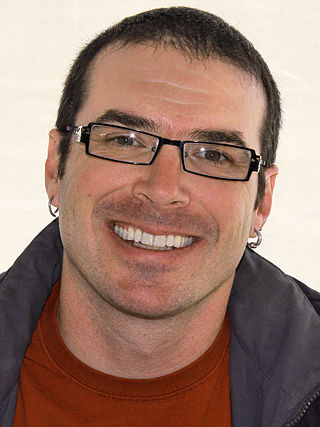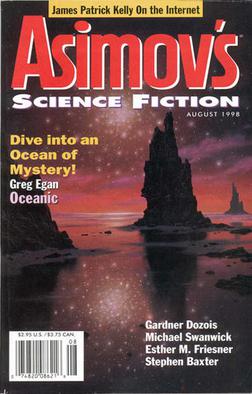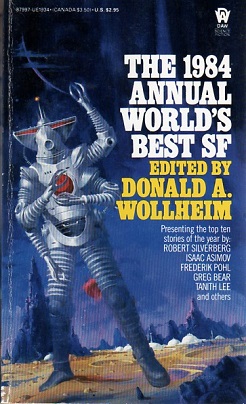Related Research Articles
Greg Egan is an Australian science fiction writer and mathematician, best known for his works of hard science fiction. Egan has won multiple awards including the John W. Campbell Memorial Award, the Hugo Award, and the Locus Award.

Gregory Dale Bear was an American science fiction writer. His work covered themes of galactic conflict, parallel universes, consciousness and cultural practices, and accelerated evolution. His last work was the 2021 novel The Unfinished Land. Greg Bear wrote over 50 books in total.

Paolo Tadini Bacigalupi is an American science fiction and fantasy writer. He has won the Hugo, Nebula, John W. Campbell Memorial, Compton Crook, Theodore Sturgeon, and Michael L. Printz awards, and has been nominated for the National Book Award. His fiction has appeared in The Magazine of Fantasy & Science Fiction, Asimov's Science Fiction, and the environmental journal High Country News. Nonfiction essays of his have appeared in Salon.com and High Country News, and have been syndicated in newspapers, including the Idaho Statesman, the Albuquerque Journal, and The Salt Lake Tribune.
"Wang's Carpets" is a science-fiction short story by Australian writer Greg Egan, first published in New Legends edited by Greg Bear and Martin H. Greenberg on 5 April 1995.
"The Planck Dive" is a science fiction novelette by Australian writer Greg Egan, published in 1998.

"Oceanic" is a science fiction novella by Australian writer Greg Egan, published in 1998. It won the 1999 Hugo Award for Best Novella.

The 1984 Annual World's Best SF is an anthology of science fiction short stories edited by Donald A. Wollheim and Arthur W. Saha, the thirteenth volume in a series of nineteen. It was first published in paperback by DAW Books in June 1984, followed by a hardcover edition issued in August of the same year by the same publisher as a selection of the Science Fiction Book Club. For the hardcover edition the original cover art by Vincent Di Fate was replaced by a new cover painting by Richard Powers.

The 1987 Annual World's Best SF is an anthology of science fiction short stories edited by Donald A. Wollheim and Arthur W. Saha, the fourteenth volume in a series of nineteen. It was first published in paperback by DAW Books in June 1987, followed by a hardcover edition issued in July of the same year by the same publisher as a selection of the Science Fiction Book Club. For the hardcover edition the original cover art by Tony Roberts was replaced by a new cover painting by Richard Powers.

The 1989 Annual World's Best SF is an anthology of science fiction short stories edited by Donald A. Wollheim and Arthur W. Saha, the eighteenth volume in a series of nineteen. It was first published in paperback by DAW Books in June 1989, followed by a hardcover edition issued in September of the same year by the same publisher as a selection of the Science Fiction Book Club. For the hardcover edition the original cover art by Jim Burns was replaced by a new cover painting by Richard M. Powers.

Nebula Awards 22 is an anthology of award winning science fiction short works edited by George Zebrowski, the third of three successive volumes under his editorship. It was first published in hardcover and trade paperback by Harcourt Brace Jovanovich in April 1988.
Suzanne Palmer is an American science fiction writer known for her novelette "The Secret Life of Bots", which won a Hugo Award for Best Novelette in 2018. The story also won a WSFA Small Press Award and was a finalist for the Theodore Sturgeon Award.
"Didicosm" is a science-fiction short story by Australian writer Greg Egan, first published in Analog in July/August 2023.
Dark Integers and Other Stories is a collection of five science-fiction short stories by Australian writer Greg Egan, published on 25 March 2008 by Subterranean Press. One of them, "Oceanic", won the Hugo Award for Best Novella, while two others were nominated.
"Luminous" is a science-fiction short story by Australian writer Greg Egan, first published in Asimov’s Science Fiction in September 1995.
"Dark Integers" is a science-fiction short story by Australian writer Greg Egan, first published in Asimov's Science Fiction in October/November 2007. The short story was included in the collections Dark Integers and Other Stories in 2008, Oceanic in 2009 and The Best of Greg Egan in 2020. It was nominated for the Hugo Award for Best Novelette in 2008. It is a sequel to the short story "Luminous".
"Into Darkness" is a science-fiction novelette by Australian writer Greg Egan, first published in Asimov's Science Fiction in January 1992. The novelette was included in the collections Axiomatic in 1995 and The Best of Greg Egan in 2019.
"Riding the Crocodile" is a science-fiction novella by Australian writer Greg Egan, first published in One Million A.D. edited by Gardner Dozois in December 2005. The novella was included in the collections Dark Integers and Other Stories in 2008 and Oceanic in 2009. The short story is set in the same universe as Egan's short stories "Glory" and "Hot Rock" as well as Egan's novel Incandescence.
"Glory" is a science-fiction novelette by Australian writer Greg Egan, first published in the anthology The New Space Opera edited by Gardner Dozois and Jonathan Strahan in 2007. The novelette was included in the collections Dark Integers and Other Stories in 2008 and Oceanic in 2009. The novelette is set in the same universe as Egan's novellas "Riding the Crocodile" and "Hot Rock" as well as Egan's novel Incandescence.
Instantiation is a collection of eleven science-fiction short stories by Australian writer Greg Egan, published in 2020.
Sleep and the Soul is a collection of ten science-fiction short stories by Australian writer Greg Egan, published in 2023.
References
- ↑ "Bibliography". 2024-04-09. Retrieved 2024-04-17.
- ↑ "Summary Bibliography: Greg Egan" . Retrieved 2024-04-19.
- ↑ "Rich Horton Reviews Short Fiction: Analog, Asimov's, and F&SF". Locus Online. 2019-10-14. Retrieved 2024-11-03.
- ↑ "Analog, July/August 2019 - Tangent Online". 2019-06-15. Retrieved 2024-11-07.
- ↑ "Analog Science Fiction and Fact - July/August 2019 - Vol. CXXXIX, Nos. 7 & 8". www.gumshoereview.com. Retrieved 2024-11-07.
- ↑ "2019 Analog AnLab and Asimov's Readers' Awards Finalists". Locus Online. 2020-02-11. Retrieved 2024-11-03.